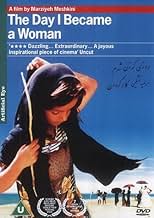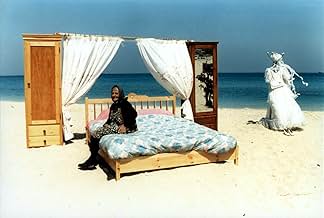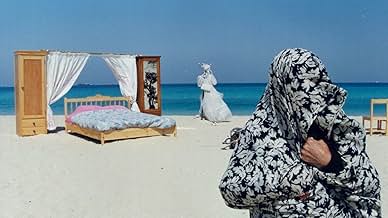Roozi ke zan shodam
- 2000
- 1 h 18 min
AVALIAÇÃO DA IMDb
7,3/10
2,1 mil
SUA AVALIAÇÃO
Adicionar um enredo no seu idiomaThree linked stories show women at life's crossroads: a girl's 9th birthday, a cycling race, and an elderly woman's dream of buying long-desired items.Three linked stories show women at life's crossroads: a girl's 9th birthday, a cycling race, and an elderly woman's dream of buying long-desired items.Three linked stories show women at life's crossroads: a girl's 9th birthday, a cycling race, and an elderly woman's dream of buying long-desired items.
- Direção
- Roteiristas
- Artistas
- Prêmios
- 10 vitórias e 5 indicações no total
- Direção
- Roteiristas
- Elenco e equipe completos
- Produção, bilheteria e muito mais no IMDbPro
Avaliações em destaque
I had completely forgotten about this movie, until I had a dream about the bicycles and the beach at the end. The more I thought back, the more I wanted to see it again.
I know this film has a very firm political message, but the images are so simple, universal and kinda powerful they linger with you, or at least have with me for years.
Three stories, none of which connect, about woman living in Iran, a young girl who finds out she has has to go to the "all girls" school soon, leaving behind her male friends, a woman bicycles away from her wedding and refuses to pull over, an and elderly woman whose husband is dead who can now do what she has always wanted, create the home of her dreams, with furniture right along the beach; a house without walls.
Effective, original, and poignant. When does one, become a woman(or man), and why? How is it different for each character, how is it the same, and what does is spell out once it's all putt together? ...almost makes me want to learn to ride a bike.
I know this film has a very firm political message, but the images are so simple, universal and kinda powerful they linger with you, or at least have with me for years.
Three stories, none of which connect, about woman living in Iran, a young girl who finds out she has has to go to the "all girls" school soon, leaving behind her male friends, a woman bicycles away from her wedding and refuses to pull over, an and elderly woman whose husband is dead who can now do what she has always wanted, create the home of her dreams, with furniture right along the beach; a house without walls.
Effective, original, and poignant. When does one, become a woman(or man), and why? How is it different for each character, how is it the same, and what does is spell out once it's all putt together? ...almost makes me want to learn to ride a bike.
This is a beautifully shot, richly textured film. Its decidedly surrealist elements do not detract from its poignant central message: that the arbitrary social conventions which govern womens' lives in Iran are inherently absurd. What is so striking about this film is the way in which the director brings out this element of absurdity by transplanting an Iranian narrative onto the bizarre setting of Kish Island, a free trade zone and resort off the coast of Iran. The women in the film are all forced to play out the roles assigned for them by Iranian society, despite the virtual absence of the state, which is so often demonized in treatments of Iranian women's lives.
I saw "Roozi khe zan shodam" ("The Day I Became a Woman") a few days ago during the Memorial Day holiday. It was a good film with strong, subtle acting and quite interesting camera shots.
In a nutshell, the film is about women in contemporary Iran. It depicts compelling accounts about a girl who has just turned nine and is now therefore considered to be a woman and expected to leave childhood play behind; a woman's bicycle race and the strong objection a husband has to his wife's participation; and an elderly woman who has in earlier life deferred her desires to buy consumer goods and finally has the opportunity to realize her spending dreams.
Without having lived in or even visited Iran, I can't judge the realism of "Roozi khe zan shodam". The camera offers us an innocent, child-like eye, just observing these characters and leaving us to draw our own conclusions. I particularly enjoyed the cinematography of the mass of women cyclists, all clad in black practically head to foot, pedaling away almost entirely in silence except for the rhythmic pedaling noises; and the parallel shots focusing on the legs of the galloping horses, carrying the complaining husband and his cohorts. The pedaling wife Ahoo (Shabnam Tolui) never speaks a word, but her focused and desperate efforts indicate her quest for increased independence. I also enjoyed following the activities of 9-year-old Hava (Fatemeh Cherag Akhar).
I would see "Roozi khe zan shodam" again for its cinematography and the unique (at least for Western audiences) life experiences depicted. It's by no means Hollywood fare or even overtly feminist, but allows the viewer to settle in for a bit of (realistic or stylized?) local color and look at perspectives there of women in three different stages in their lives.
In a nutshell, the film is about women in contemporary Iran. It depicts compelling accounts about a girl who has just turned nine and is now therefore considered to be a woman and expected to leave childhood play behind; a woman's bicycle race and the strong objection a husband has to his wife's participation; and an elderly woman who has in earlier life deferred her desires to buy consumer goods and finally has the opportunity to realize her spending dreams.
Without having lived in or even visited Iran, I can't judge the realism of "Roozi khe zan shodam". The camera offers us an innocent, child-like eye, just observing these characters and leaving us to draw our own conclusions. I particularly enjoyed the cinematography of the mass of women cyclists, all clad in black practically head to foot, pedaling away almost entirely in silence except for the rhythmic pedaling noises; and the parallel shots focusing on the legs of the galloping horses, carrying the complaining husband and his cohorts. The pedaling wife Ahoo (Shabnam Tolui) never speaks a word, but her focused and desperate efforts indicate her quest for increased independence. I also enjoyed following the activities of 9-year-old Hava (Fatemeh Cherag Akhar).
I would see "Roozi khe zan shodam" again for its cinematography and the unique (at least for Western audiences) life experiences depicted. It's by no means Hollywood fare or even overtly feminist, but allows the viewer to settle in for a bit of (realistic or stylized?) local color and look at perspectives there of women in three different stages in their lives.
On the surface this film tells three simple stories, but its simplicity is deceiving. Each story tells an episode in the life of a woman but as the woman ages the stories become more and more surreal. In so doing Marzieh Meshkini is making a parallel with the life of Iranian women.
10jakub66
Having followed Iranian cinema for a while I didn't think I was in for a surprise but Meshkini (director) managed to blow me away with the minimalist approach to depicting the fundamental issues of Iranian society. The elegance, minimalism and eloquence of this picture manage to depict the role of a woman in Iran with painful clarity.
"Roozi khe zan shodam" is an essential and defining piece of cinema.
"Roozi khe zan shodam" is an essential and defining piece of cinema.
Você sabia?
- CuriosidadesMarzieh Makhmalbaf's directorial film debut.
- Erros de gravaçãoIn the first sequence, the lollipop that Hava and Hassan pass between them grows and shrinks in size without regard to the passage of time.
- Citações
Grandmother: Will you promise to be back by noon?
Hava: I promise!
Grandmother: God won't forgive you if you lie. Don't be late.
- ConexõesFeatured in Women Make Film: A New Road Movie Through Cinema (2018)
Principais escolhas
Faça login para avaliar e ver a lista de recomendações personalizadas
Detalhes
- Data de lançamento
- País de origem
- Centrais de atendimento oficiais
- Idioma
- Também conhecido como
- The Day I Became a Woman
- Locações de filme
- Kish Island, Irã(location)
- Empresas de produção
- Consulte mais créditos da empresa na IMDbPro
Bilheteria
- Orçamento
- US$ 180.000 (estimativa)
- Faturamento bruto nos EUA e Canadá
- US$ 149.971
- Fim de semana de estreia nos EUA e Canadá
- US$ 48.255
- 8 de abr. de 2001
- Faturamento bruto mundial
- US$ 149.971
Contribua para esta página
Sugerir uma alteração ou adicionar conteúdo ausente



















